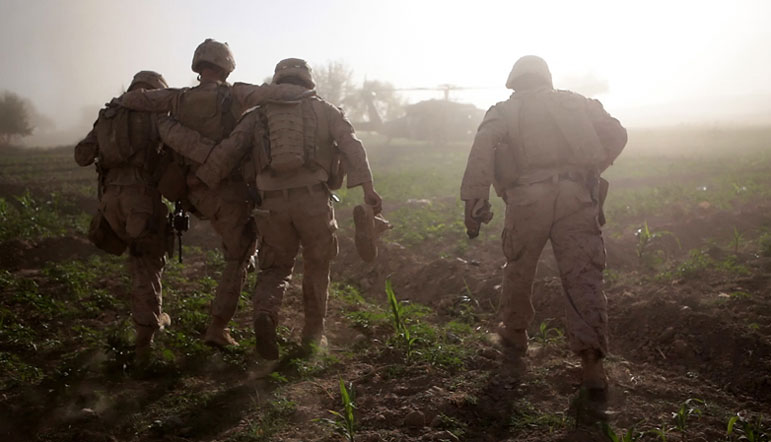
Directed by Danfung Dennis
Produced by Mike Lerner & Martin Herring
Released by Docurama Films
Pashtu & English with English subtitles
USA. 88 min Not rated
Accomplished photojournalist Danfung Dennis spends time behind enemy lines in Afghanistan tracking Echo Company, an outfit of the U.S. Marine corps assigned to a reconnaissance mission moving deep into unknown territory. When their commanding officer, Sergeant Nathan Harris, is hit and suffers a tour-ending leg injury, Dennis continues his investigation. Intercut with the battle footage are (mostly) candid scenes of Nathan at home with his young wife, recovering from his injury and adapting to the stark contrast of civilian life.
The cinematography during the Afghan section is impressive. Dennis combines a keen eye for drama and a unique artistic sensibility with what I’d call unprecedented access if I hadn’t already seen both Restrepo and Armadillo. His camera is always in the right place, capturing both action and response in the faces of the (always shockingly young) soldiers. The dynamic visuals aside, if you’ve read or seen anything in the last eight years, you won’t be too surprised by the events. The troops go through the familiar routine of forcibly eliciting intelligence from other shockingly young would-be Taliban soldiers, navigating the un-navigable terrain, and explaining to the local elders who is in charge, while blurting awkward apologies for brazenly upsetting the delicate balance of their impoverished rural lives.
The return home yields nothing if not the sad ironic fact that fighting for “the American way” means fighting for the opportunity to return to lonely strip malls, chain restaurants, and a dependency on big Pharma. These drab visuals are in direct contrast to the stunningly beautiful Afghan mountain ranges to which Dennis often returns. The compositions are hardly boring, though. In fact, we are challenged to explore these murky suburban depths beside Nathan and to question what kind of country is this in which we live. Also, there are no less than five scenes in which he is loading, aiming, or sleeping near his glock 9mm.
Nathan, though, a sharply intelligent 27 year old, mugs for the camera too often. He’s almost constantly aware of the presence of an audience, and his scenes feel too much like a reality show for my taste. I believe that he feels frustration and pain, but he often feigns the effects of it for our benefit and winds up merely performing. These scenes fall flat as the Born on the 4th of July tropes continue, and by the end, surprisingly little is actually revealed about the man. We see him rather as a patient, a test case, so that during his physical therapy routines, we respond much more strongly to the truth of his situation as the real physical pain registers on his face.
In effect, Hell and Back Again is a uniquely beautiful piece of journalism. It comes out of a passion for reporting on this war as it is, but Dennis’s impartiality is a bit of a stumbling point as well. I wanted to be angrier at the end of this film, or at least to feel like I had a better sense of who to blame for this American soldier’s personal struggle. In fact, after seeing the havoc being wreaked by the Americans in Afghanistan, I’m not sure I have a clear sense of whether it’s the American soldier and not the Afghani tribesmen to whom I owe my sympathies. Perhaps in this powerful first feature, Dennis shows us just a bit too much.






Leave A Comment